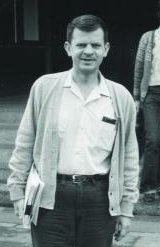A Quote by Edward Abbey
The axiom of conditioned repetition, like the binomial theorem, is nothing but a piece of insolence.
Quote Topics
Related Quotes
How can you shorten the subject? That stern struggle with the multiplication table, for many people not yet ended in victory, how can you make it less? Square root, as obdurate as a hardwood stump in a pasturenothing but years of effort can extract it. You can't hurry the process. Or pass from arithmetic to algebra; you can't shoulder your way past quadratic equations or ripple through the binomial theorem. Instead, the other way; your feet are impeded in the tangled growth, your pace slackens, you sink and fall somewhere near the binomial theorem with the calculus in sight on the horizon.
Combinatorial analysis, in the trivial sense of manipulating binomial and multinomial coefficients, and formally expanding powers of infinite series by applications ad libitum and ad nauseamque of the multinomial theorem, represented the best that academic mathematics could do in the Germany of the late 18th century.
If you have to prove a theorem, do not rush. First of all, understand fully what the theorem says, try to see clearly what it means. Then check the theorem; it could be false. Examine the consequences, verify as many particular instances as are needed to convince yourself of the truth. When you have satisfied yourself that the theorem is true, you can start proving it.
I think that if your tenure case depends on your proving what you thought was a mathematical theorem and the proposed theorem turns out to be false just before your tenure decision, and you want to get tenure very badly, there is a sense in which it's perfectly understandable and reasonable of you to wish the proposed theorem were true and provable, even if it's logically impossible for it to be.
Christmas, in fact, is not an external event at all, but a piece of one's home that one carries in one's heart: like a nursery story, its validity rests on exact repetition, so that it comes around every time as the evocation of one's whole life and particularly of the most distant bits of it in childhood.
There is a value in repetition. When we repeat certain phrases and even actions, like fingering prayer beads, we create a quiet rhythm within our spirits. The beating of our heart is a repetition as is the rhythm of our breathing. All of life has its rhythms, and the repetition of familiar prayers can bring our interior spirits into harmony with the Divine Heartbeat and the breathing of the Divine Christ.

































